Attacks involving arson against operations and machinery in the Southern Macrozone increased by 22% during the January-July 2022 period compared to the previous year, according to figures from the Association of Forestry Contractors.
But that’s not all. While we know the violence has spread across all regions of Biobío and La Araucanía, even reaching Los Ríos and Los Lagos, last week an attack left two forestry machines and a pickup truck destroyed in Paredones, O’Higgins Region. This comes alongside statements from Héctor Llaitul, leader of the CAM, about "recovering timber" to "buy guns and bullets" and advance their cause.
In El Agro, we spoke with René Muñoz, manager of the Association of Forestry Contractors, ACOFORAG.
For Muñoz, what is happening in the Southern Macrozone "is a symptom that governments have not emphasized this major problem. This dates back to '97—25 years in which successive governments have turned a blind eye and lacked the will to solve it."
He adds that "today, the damage is done in La Araucanía and Biobío, it’s starting in Los Ríos and Los Lagos, and we’re also seeing it in the O’Higgins Region. And this is turning into a business, just as Llaitul said. We ask the current government, what more needs to happen? You see that actions aren’t being taken."
Regarding the State’s inaction, Muñoz stresses that "we have the impression that there is no political interest or will. Here, intervening more directly means confrontations, and that means injuries, likely even deaths—so no one wants to bear that responsibility. And that’s the core issue."
He further states that "successive governments have avoided this because they ultimately say the damage is minor, but it’s affecting a sector of the country’s forestry and agricultural development that is tremendously important. We generate 300,000 direct jobs, meaning 1.2 million people depend on it. In the Eighth Region, 70% of exports come from the forestry sector. The woman selling tortillas depends on the forestry sector, the taxi driver picking up executives at the airport depends on the forestry sector. So let’s be serious—do we want this to continue, or do we want destruction? That’s what we’re demanding."
Regarding the groups operating in the area, Muñoz asserts that "today, we have 6 or 7 groups active in the zone, one of which acted in Paredones. This started with the CAM, which was just one group—now we have 6, and there are no limits. What’s happening here is that this business of violence is lucrative and profitable for everyone."
Source:radioagricultura.cl







Comments (0)
No comments yet. Be the first to comment!
Leave a comment